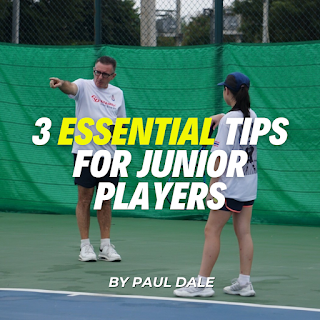JUNIORS WILL IMPROVE USING THESE 3 ESSENTIALS
If you’re a junior tennis player or coaching junior players focusing on the right skills can make all the difference. Let’s explore three essentials that can make all the difference to a junior career and set you up for your next step in tennis.
1. The Value of Underspin
Underspin is one of the most useful tools in tennis, but it’s often overlooked by young players and their coaches. Underspin keeps it low and controlled. Mastering underspin gives you a significant edge in several parts of the game:
- Approach Shots: The art of moving forward in the court and putting pressure on the opponent is missing from a lot of junior games. However, if you can't move forward to the net when the opportunity arises later at the professional level your game will be severely limited. Underspin keeps your approach shot low and forces your opponent to hit up, giving you an easier volley and making it harder for them to pass you at the net.
- Volleys: When volleying, underspin helps you create feel allowing you to place the ball with greater precision. It also keeps the ball low after the bounce and again making it harder for the opponent to pass you or hit offensively.
- Dropshots: The dropshot has become an added weapon in today's tennis and underspin keeps the first two bounces together, which should be the goal when you employ the dropshot.
- Defensive Play: I see a lot of juniors who hit the ball really well from the baseline but, due to their limited option of grips, can only hit topspin. When you’re under pressure and being forced wide in the rally topspin is often not possible. You need another way to respond to the low or late contact you're forced to hit on defence. Underspin can also be used to slow the speed of the rally if that's needed.
- Low Balls: On short and low balls, being able to switch into your underspin grip allows you to control these shots better.
Adding underspin to your game equips you with more variety and control, making it harder for your opponent to find weaknesses in your game.
2. Movement: The Most Underrated Weapon in Tennis
The best tennis players aren’t just good ball strikers—they’re exceptional movers. Great movement allows you to reach the ball in time, strike it cleanly, and stay balanced. Poor movement exposes you to all three of those elements.
Here’s why movement is so important:
- Timing and Balance: Good movement puts you in the perfect position to hit the ball, ensuring clean contact, optimal timing and accuracy.
- Creating Time: Quick, efficient footwork gives you the extra seconds you need to decide on, and execute your best shot selection options.
- Intimidating Opponents: When you move well, you can neutralize your opponent’s best shots, making them feel like they can’t put you under pressure. They may decide to increase the speed of their shots or go for smaller margins. either way you're getting inside their head and creating panic.
Think of movement like you think of your strokes. Your strokes and your movement as equally important. Movement is the foundation of every stroke you play. Spend more time working on it!
3. Mental Resilience: A Competitive Advantage
I've left the most important to last.
Tennis is a mentally challenging sport. With its unique scoring system, you can lose more points than your opponent and still win the match. That’s why mental resilience is essential for competitive juniors.
Here’s how mental toughness helps:
- Recovering from Mistakes: Everyone makes errors in tennis. The key is to move past them quickly and stay focused on the next point. Easier said than done but entirely necessary.
- Staying Positive: A positive mindset keeps you calm and, most importantly, creative, If you're down a break you need to find a way to get back in the match. Finding solutions requires you to stay positive even in tough situations.
- Dealing with Pressure: Mental resilience ensures you don’t crumble under the stress of tight matches or big points. Having a resilient mindset doesn't let tough moments take over your decision-making or stroke execution too much.
Building mental toughness takes time, but it’s one of the most valuable skills you can develop. Resilient players are the ones who keep fighting, no matter the score, and find ways to win when it matters.
Conclusion
Improving as a junior tennis player means focusing on the essentials that will set you apart:
- Learn to use underspin to control the ball and gain an advantage in a variety of situations.
- Develop your movement to improve your ball striking and perhaps even intimidate your opponents.
- Build mental resilience to stay focused, positive, and determined, even when the match gets tough.
By mastering these three areas, you’ll not only become a better player but also set yourself up after you move out of juniors.

.png)

.jpg)
.jpg)

%20copy.png)

Comments
Post a Comment